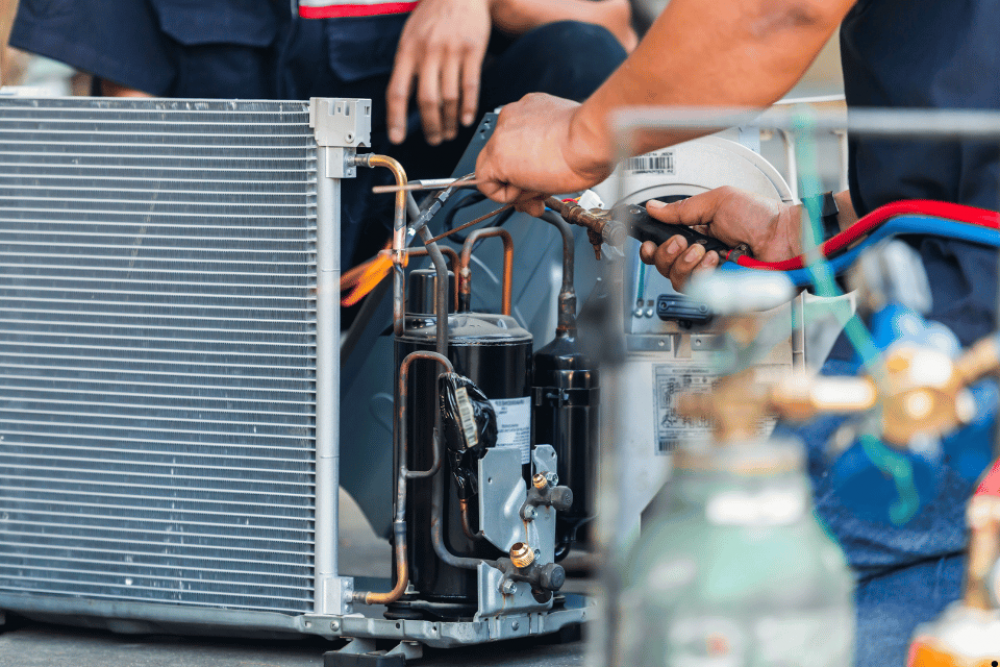
Choosing Between HVAC Repair or Replacement: Insights from Contractors
When faced with HVAC issues, homeowners often wrestle with whether to repair or replace their systems. This decision is crucial, as it impacts comfort, energy efficiency, and long-term costs. We will explore insights from HVAC contractors on how they advise clients in making this pivotal choice.
Factors Influencing the Decision
Several factors influence whether an HVAC system should be repaired or replaced. Age and frequency of repairs play a significant role. HVAC systems typically last 10-15 years; beyond this, repairs may become more frequent and costly. Contractors emphasize that if repairs are becoming more frequent and expensive, opting for replacement might be more economical in the long run. Moreover, technological advancements have made newer systems more energy-efficient, which can translate into lower utility bills over time.
Assessment and Evaluation
Contractors stress the importance of a thorough assessment before making a decision. They conduct detailed evaluations of the HVAC system's overall condition, including checking for leaks, assessing the ductwork's efficiency, and examining the indoor air quality. This evaluation helps understand whether the issues are localized and repairable or indicative of broader systemic problems that warrant replacement. Additionally, contractors consider the homeowner's long-term plans for the property, influencing the investment in HVAC repairs or replacement.
Cost Considerations
When deciding between HVAC repair and replacement, cost is a significant factor for homeowners. Contractors provide cost-benefit analyses, comparing the expense of immediate repairs against a new system's long-term savings and benefits. While upfront costs for replacement can be higher, contractors highlight potential savings from increased energy efficiency and reduced repair expenses over the system's lifespan. They also advise clients on financing options and possible rebates for energy-efficient HVAC upgrades, which can mitigate initial costs.
Environmental Impact
Environmental considerations are increasingly important for homeowners and contractors alike. Older HVAC systems may use refrigerants harmful to the environment, such as R-22, which is being phased out. Contractors educate homeowners on the environmental benefits of newer systems that use more eco-friendly refrigerants and are designed to minimize energy consumption. They emphasize how replacing an outdated system can positively reduce carbon footprints and promote sustainability.
Long-Term Performance and Warranty
Contractors emphasize the importance of considering long-term performance and warranty coverage when deciding between HVAC repair or replacement. New HVAC systems often have extensive warranties covering major components for several years. This gives homeowners peace of mind, knowing they are protected against unexpected repair costs. Contractors also explain the potential limitations of warranties on older systems and how ongoing repairs can add up over time, making replacement a more financially prudent choice.
Home Comfort and Efficiency
Ultimately, HVAC repair or replacement aims to enhance home comfort and efficiency. Contractors work closely with homeowners to understand their comfort preferences and usage patterns. They recommend HVAC solutions tailored to the size and layout of the home, ensuring optimal airflow and temperature control in every room. Newer HVAC systems offer advanced features like programmable thermostats and zoning options, allowing for customized comfort settings and energy savings. Flow-Tech Plumbing & Heating, Inc. of Columbia City highlights how investing in a modern HVAC system can significantly improve indoor air quality and home comfort.
Energy Efficiency and Savings
Energy efficiency is a critical factor that contractors emphasize when discussing HVAC repair or replacement. Older systems have lower efficiency ratings than newer models that adhere to updated energy standards. Contractors educate homeowners on the potential energy savings achievable with a modern HVAC system, which can often offset the initial investment over time. They highlight features such as variable-speed motors, which adjust airflow based on heating and cooling demands, and high SEER (Seasonal Energy Efficiency Ratio) ratings, indicating superior efficiency. By upgrading to a more efficient HVAC system, homeowners can enjoy lower monthly utility bills and reduce their overall carbon footprint.
Technological Advancements
Advancements in HVAC technology have revolutionized system performance and functionality. Contractors discuss how newer systems integrate innovative technology, allowing remote access and control via smartphones or tablets. Homeowners appreciate the convenience of adjusting temperature settings and monitoring energy usage from anywhere, enhancing overall system management and efficiency. Additionally, advanced diagnostic capabilities in modern HVAC systems enable contractors to accurately pinpoint issues during maintenance visits, reducing downtime and repair costs over the system's lifespan.
Consultation and Professional Guidance
Contractors stress the importance of consulting with HVAC professionals to guide decision-making regarding repair or replacement. Professional assessments consider specific factors unique to each home, such as insulation levels, ductwork conditions, and geographic climate considerations. Contractors provide personalized recommendations based on these evaluations, ensuring homeowners understand all available options and their associated costs and benefits. This customized approach helps homeowners make informed decisions aligned with their comfort needs, budget constraints, and long-term sustainability goals. By partnering with experienced HVAC contractors, homeowners can navigate the complexities of HVAC system decisions confidently and effectively.
The decision between HVAC repair and replacement is multifaceted and requires careful consideration of various factors. By consulting with experienced contractors and evaluating their HVAC systems' age, condition, and efficiency, homeowners can make informed decisions that align with their long-term goals and budgetary constraints. Whether opting for repairs to extend the life of an existing system or investing in a new, energy-efficient HVAC system, homeowners can enhance home comfort, reduce energy costs, and contribute to environmental sustainability. Making the correct choice today can lead to lasting benefits tomorrow, ensuring comfort and efficiency for years.

